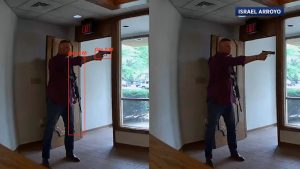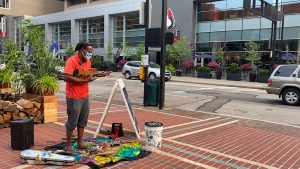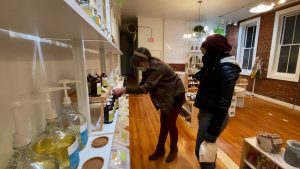CLEVELAND — Julie Brizard is a competitive athlete. She always has been.
“That’s just me,” she said. “I like to be moving.”
The Novi, Michigan woman works hard to be the best in anything she does. Despite living an active lifestyle and being out on the tennis court four to five days a week, the mother of two experienced something she never saw coming in January 2020.
“I remember having a wide open crosscourt forehand that I mean I will hit 99/100 times as a winner and I missed it by 20 feet which is just crazy, and I looked back at my partner and I said ‘God, I’m so sorry.’ And that was the last thing I remember,” said Brizard.
She woke up from a coma days later confused.
“When my husband came in, I looked at him and I go,“who hit me?” because I thought I was in a car accident,” she said. “There’s just no way on God’s green earth I would have ever guessed that I would have collapsed in a sporting event.”
Heart disease is the leading cause of death in the U.S and February is American Heart Month. On @SpectrumNews1OH, hear the story of one competitive tennis player who unexpectedly went into cardiac arrest. After searching for answers, she now has a message for others ❤️ pic.twitter.com/5zbtwfDmtC
— Micaela Marshall (@MMarshallTV) February 4, 2022
Brizard learned that she suffered a sudden cardiac arrest while playing tennis. Doctors who happened to be at the club saved her with an AED.
“Super traumatizing, obviously, for the people around because, like, if this kind of thing could happen to me, it’s going to happen to anyone,” she said. “I’m in perfect shape. I don’t have any issues. Nothing. I’ve never been sick. I don’t even take Advil.”
None of it made sense to Brizard. Her doctors in Michigan prescribed her medication and put an implantable cardioverter-defibrillator (ICD) in her chest.
“I’m struggling because, do I accept it still?” she said. “I still have moments of ‘why me?'”
Brizard said she felt angry and embarrassed. She had no diagnosis and needed to understand why this happened to her.
“Being an athlete, exercising my whole life, pushing myself, having this event happen and no good reason why. Because I did all the right things. There had to have been something else,” said Brizard.
So, she sought out a second opinion. That’s when she came to the Sports Cardiology Center at the Cleveland Clinic. Brizard described having blackouts frequently and she knew something was wrong. While her new medical team searched for answers, she experienced another heart event in October 2020.
“I was making dinner for my kids and my son was eating and I was waiting for my daughter to wake up to get her food and then the next thing I knew I was on the ground,” said Brizard.
The ICD shock saved her life.
“I don’t like to complain too much, but I think I’m going to die. I think this is the end if something is not figured out,” she remembers telling the co-director of the Sports Cardiology Center at the Cleveland Clinic, Dr. Tamanna Singh.
The Cleveland Clinic gave Brizard a PET scan, which finally revealed her diagnosis: Sarcoidosis. It’s a disease characterized by the growth of tiny collections of inflammatory cells. For Brizard, this occurred in the septum of the heart.
“More often times than not, sarcoidosis affects the lung. It’s multi-systemic. So, lung, skin, eye, tend to be the most common, but it can impact the heart muscle,” said Singh. “And basically, sarcoidosis is these groups of cells, these immune cells, that form what we call granulomas, and these granulomas are these inflammatory areas that can then in the heart, precipitate abnormal heart rhythms, cause the heart to ‘fail’ or not contract as it should normally [and] can lead to symptoms and signs of heart failure. And so for her what happened was she developed these granulomas, this inflammation within her heart muscle, and actually, she had inflammation all over her body in her lymph nodes and in her lungs and in her spleen. But the inflammation within the heart muscle was the basic nidus for her having that abnormal heart rhythm that caused her to collapse on court.”
Armed with new information, her doctors gave her a new treatment plan.
“I knew within days I was better,” she said.
Today at age 50, Brizard is feeling more like herself again.
“I’m back on court,” she said. “I’m back doing interval training on the treadmill. I don’t have any blackout episodes. I don’t fear for my life anymore. I’m back.”
Although she saw no warning signs at the time, Brizard recalls dealing with heart palpitations for two years prior to the first cardiac arrest.
Now she wants to encourage others to take charge of their heath and listen to their body.
“Do not accept that your symptoms are normal and then get checked out completely. If that first answer isn’t good enough for you, try to find another one,” she said.
“If you’re going to take anything away from stories like Julie’s, it’s to be intentional about your health. We don’t feel things like high blood pressure or high sugar in the blood or high cholesterol. No, we really kind of see only what is on our surface, and it takes commitment to seeing a clinical provider on a regular basis to actually have those things done,” said Singh. “Sometimes we think ignorance is bliss, but with cardiovascular disease the longer and longer you wait to see someone or to actually investigate if there’s anything you can optimize, the worse it really gets.”
The Cleveland Clinic recently released the findings of its “Love Your Heart” survey that looked at how COVID-19 has impacted heart health.
The survey included about 1,000 adult Americans and some of the big takeaways are that people are sitting more throughout the day and walking less.
KEY FINDINGS:
- 41% of Americans have experienced at least one heart-related issue since the beginning of the COVID-19 pandemic.
- One in four Americans (27%) who have tested positive for COVID-19 report that their diagnosis has impacted their heart health.
- Sitting throughout the day is on the rise while walking throughout the day has declined: 77% of Americans say they often or sometimes sit throughout the day.
- Half of Americans (51%) do not currently follow a specific diet plan.
Singh said COVID-19 doesn’t necessarily directly lead to more heart attacks and strokes, it’s more about the changes in behavior the pandemic has caused that could cause some more serious issues down the line.
“It’s not a specific diet or specific type of exercise that’s going to make you healthy or improve your cardiovascular risk,” said Singh. “It’s really about making a behavioral change that leads to a lifestyle of change. And I promise you, you know, no one goes to the gym or goes out for a walk or goes out and exercises and come back regretting it. Nearly everybody feels much better. It takes about three weeks to build a habit and consistency is key.”
Singh said cardiovascular disease is highly preventable. She said if you focus on managing your weight, eating well and avoid smoking and vaping, you can decrease your risk by 90%.




